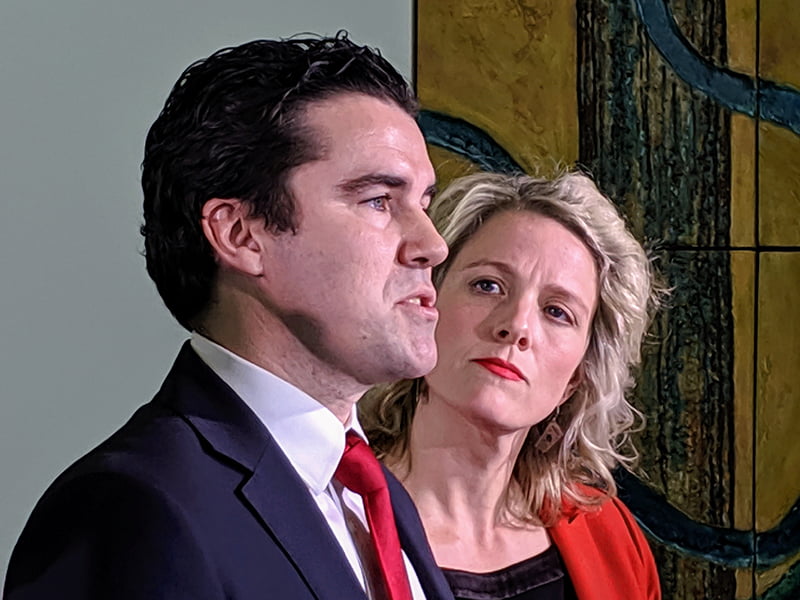Labor will this week introduce amendments “repairing” the encryption legislation in an effort to qualify Australia for a controversial data-sharing agreement with the US.
The Opposition will attempt to force the Coalition’s arm on the encryption amendments and wedge the government on national security with the introduction of the Repairing Assistance and Access Bill on Wednesday. But the amendments, which include the establishment of judicial oversight, will not be debated until parliament resumes next year.
Labor frontbenchers held a press conference on Tuesday afternoon to mark the one-year anniversary of the legislation being passed and to announce the new private senators’ bill.

“Twelve months ago, the Morrison government rammed the Telecommunications Assistance and Access Act through the Parliament. It was a failure of parliamentary process, a failure of bipartisanship on national security and a failure of the Morrison government to keep its word,” shadow assistant minister for cybersecurity Tim Watts said.
“Since then, Australia’s technology sector, particularly our cyber security sector, has been paying the price of these failures. Labor is acting to right these wrongs.”
By not introducing the amendments discussed at the time the highly controversial bill was passed, the Opposition has accused the government of breaking a promise to Australia’s tech sector, and thereby putting a “handbrake on the digital economy and hindering the creation of jobs, productivity and growth of the economy”.
The passing of the anti-encryption bill a year ago was a “body blow” for the local tech sector, shadow innovation minister Clare O’Neil said.
“What Labor wants is to make sure we get the amazing benefits that come from the future of work, and to not have to pay the costs of the downsides of the future of work. To do that we need to have a regulatory regime in this country that recognises the enormous potential of our startup sector,” Ms O’Neil said.
At the press conference, shadow attorney-general Mark Dreyfus refused to be drawn on whether he regretted supporting the legislation last year.
“Labor has always tried to operate in an atmosphere of good faith and tries to reach bipartisan agreement with government on questions of national security. Regrettably, on this occasion the government has failed to keep its word, and we’re trying to hold the government to its word,” Mr Dreyfus said.
Labor has also latched onto concerns that the encryption powers could jeopardise Australia’s chances of securing an agreement with the US under the CLOUD Act, which offers expedited access for authorities to data held by American tech firms.
Not securing such a deal would make it “harder for Australian law enforcement to quickly access the information they need to fight crime, making Australia a more dangerous place to live”, shadow home affairs minister Kristina Keneally said.
The CLOUD Act “is a fundamental tool for our law enforcement agencies, that right now operate under an old treaty where they have to wait up to two years in the middle of a police operation to get access to information,” Senator Keneally said.
Senior Deakin University lecturer specialising in technology Dr Monique Mann said there are many data security and privacy issues surrounding the CLOUD Act.
“I would argue it undermines the established processes we have for the transfer of digital evidence that we have that are really important for upholding due process rights of suspects.” Dr Mann told InnovationAus.
“These things are in conflict and the Coalition and Opposition don’t really have a principled stance on any of these issues. They’re back-flipping and offering support at a time when it’s politically advantageous to do so.”
Labor’s amendments introduce a requirement for judicial authorisation before the encryption powers are utilised, which would assist Australia in qualifying for the CLOUD Act. They also “very directly address the unimplemented recommendations” from the PJCIS inquiry last year, Mr Dreyfus said.
The Coalition is likely to reject the amendments and argue that no changes should be made until both the PJCIS and the independent national security monitor have tabled their reports into the legislation. But this argument has been rejected by the Opposition, with Senator Keneally saying the government has already agreed to these recommendations.
“The idea that we’re going to wait for one or two years before we try to fix the egregious aspects of this bill is unacceptable,” Ms O’Neil added.
Many digital rights experts are also calling for the legislation to be scrapped entirely, rather than reformed.
“We don’t want this law to be in act at all, they should never have proceeded with it,” Dr Mann said. “Amending it so it’s not as bad and adding additional safeguards is obviously good but that’s not to say the law is good.”
Do you know more? Contact James Riley via Email.

